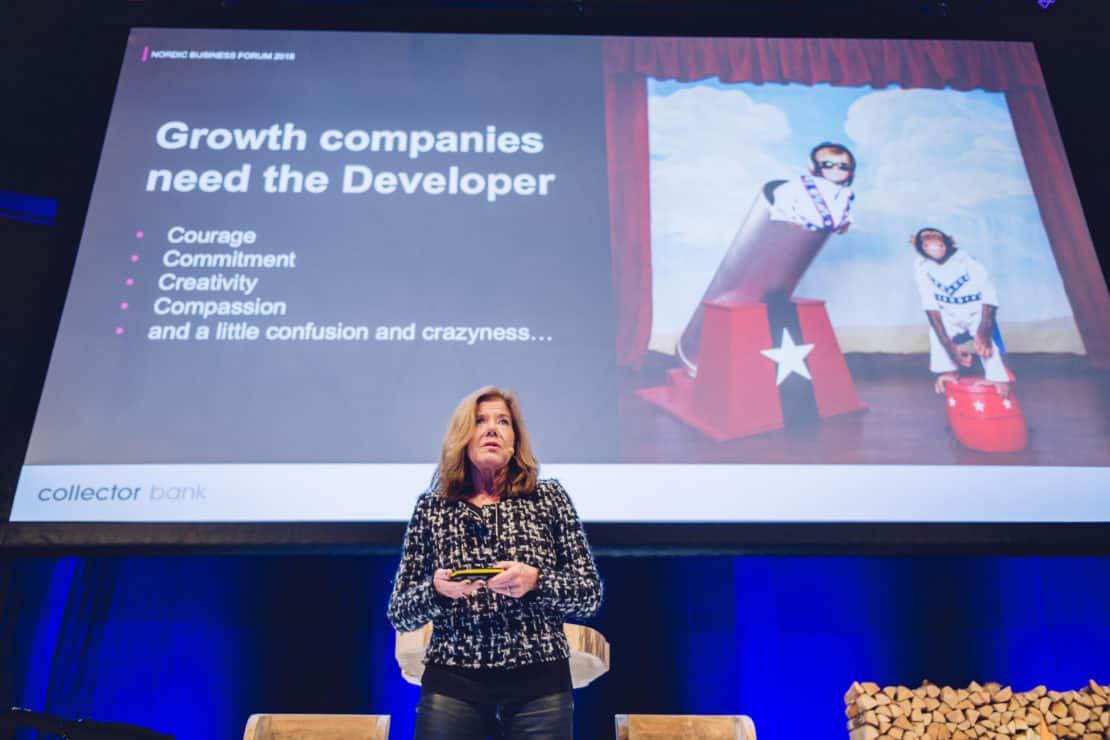26Mar2018
Though she is still in search of a scientific formula for building successful companies, Lena Apler is sure about one thing: There are two types of leaders that must eventually come together to allow for growth and an increase in company turnover and profit.
Large, established, companies are typically run by a type of personality or leader who Apler calls an administrator. They offer the organization stability, maintenance and rely on the safety of facts to make decisions. They tend to be risk-averse, making them unsuitable for founding and running a startup. That task is left to the developer. Developers embrace change, drive growth, and are willing to adopt new ideas. They are also open to learning from failing or from making mistakes.
Apler experienced this first-hand when she withdrew from the comfort of a successful corporation to start her own venture. She sees herself as a developer, having come round to the idea of entrepreneurship later in life. “Starting a company with four people is completely different to coming from an established organization with a proven track record. I was trying to convince people of my business’ viability while the ink was still drying on my business cards,” she explains.
A well-thought-out recruitment strategy is at the heart of a company’s success
Recruiting for a startup is hugely important. New hires must believe in the company’s vision and be developers in their own right, but not be so independent to lead the company astray. Everyone needs to pull together. Recruits need to fit in seamlessly with existing employees; one rotten apple will spoil the barrel, so it is crucial to take time and care when hiring new people. In Apler’s experience, recruitment mistakes can start to creep in when the company grows to around 20 people. It becomes apparent quickly that someone is not getting along, so it is important to let them go before they affect other team members and the negativity spreads.
Leaders need to identify weaknesses in their leadership strategy
In the process of starting and building a company, entrepreneurs will typically identify aspects of their leadership style and personality that need improvement. Apler says she became a control freak, checking everything had been done just as she wanted. However, this practice was exhausting and destructive. She believes most developers suffer this at some point: “I think it is rooted in anxiety.”
Apler also says that being able to admit mistakes and failures is essential for growth, and that learning from your failures and from one another are the best business lessons of all. Apler describes how she needed new competencies in her leadership team once she had reached 20 employees. At this point, she considers it wise to involve an administrator in making decisions to complement the developer’s leadership style and stabilize the company, allowing it to grow securely. Apler says that finding the perfect partnership between an administrator and a developer is essential for a business to thrive.
Once you have found a balance in the leadership team, between the developer and the administrator, growth generally follows. However, Apler thinks it is necessary for the developer to trust the administrator and team to help them embrace responsibility. Showing trust allows colleagues to be creative and take ownership of key areas, which will result in greater commitment across the board – both from the top-down and bottom-up. Encouraging ideas and letting people try them out allows creativity to flow within the organization. It becomes a demand within the business rather than just a dream.
Leaders with compassion
A great leader – regardless of the company’s size – is at the heart of an organization’s growth and success. Apler urges fellow leaders to show genuine compassion: “You need to love people to lead people.”
Leaders don’t have to be perfect all the time. It is alright to show that you don’t grasp everything immediately. Or that you are confused by something. Being open about it, starting from the top, means colleagues see it is acceptable to not know the answer to every question straight away. This openness is a way in which a tight team develops, going on to a collective learning journey.
However, this creativity and flexibility needs to be monitored to ensure that the company’s mission and vision remain the collective focus. That’s why Apler considers it smart to employ someone who is your exact opposite, someone who challenges you at different stages and questions whether the company is on the right path.
Human leadership rules
Apler says she believes that we can’t digitize leadership; artificial intelligence (AI) is no substitute for human qualities. However, she quickly adds that a mixture of intelligence, emotion, and a little bit of AI could be the perfect recipe.
In Apler’s mind, the best leaders are also the greatest listeners. If you can learn to listen to those around you, she advises, creativity will flow and your company will grow as a result. You have to leave egos at the door and accept that some people will have better ideas than you. Embrace them and your turnover will be enhanced and your company will be strengthened.
This article is a part of the Executive Summary of Nordic Business Forum Sweden 2018. Get your digital copy of the summary from the link below.


